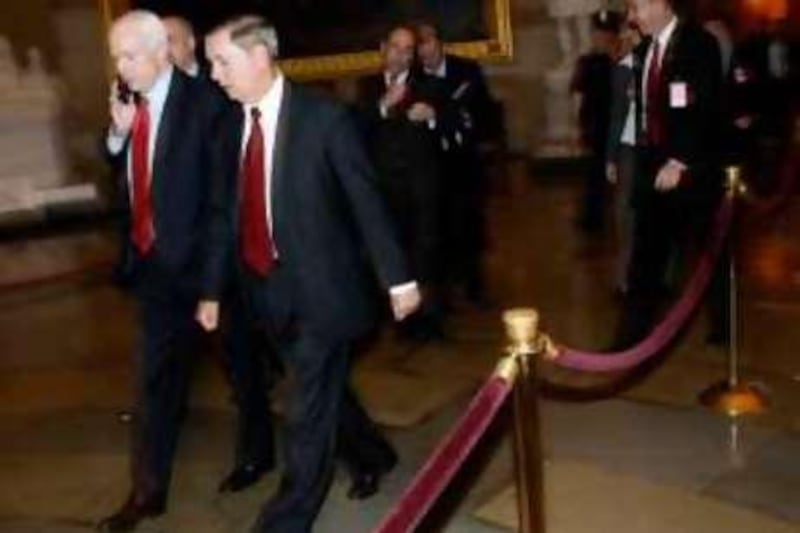WASHINGTON // The financial crisis on Wall Street - and its impact on Main Street America - have flipped the road to the White House on its head. And so, it seems, has John McCain.
As legislators reached a tentative deal on a $700 billion bailout plan following a weekend of heated back room debates, Mr McCain has shaken up his approach to an election suddenly consumed by a single issue that has not been seen as one of his strengths: the economy. Last week he suspended his campaign to focus on the crisis and took an unprecedented step by pushing for last Friday's debate to be postponed, though he eventually attended the event as scheduled. Instead of hitting the campaign trail on one of a dwindling number of weekends before the election day, the Republican candidate spent it on Capitol Hill at the epicentre of the financial storm.
The change of direction surprised Barack Obama, who was reluctant to interrupt his own campaign, which is enjoying a boost in support, according to the latest polls. But on Thursday, the Democratic candidate suddenly found himself plucked from the campaign trail and sitting at a table with George W Bush, the president - at a meeting suggested by Mr McCain. Mr McCain "has always been this kind of risk taker, and I think it has been heightened by this situation", said John C Fortier, a research fellow at the conservative American Enterprise Institute. "The generic numbers are so bad for Republicans right now that they are lucky to have John McCain at the top of the ticket because he is so different."
The 72-year-old Republican already proved his willingness to take political risks when he picked Sarah Palin, who has served as Alaska's governor for only two years, to be his running mate. The choice of Mrs Palin, at least initially, was popular and resulted in a surge in national polls. Now Mr McCain could use a similar boost to his economic credentials. An NBC News/Wall Street Journal poll released last week showed nearly six out of 10 voters were worried about their financial situation, and Mr Obama, the Democratic candidate, holds a 46 per cent to 34 per cent advantage over Mr McCain on the question of which candidate would best handle the economy - the voters' top concern.
But if Mr McCain had hoped to ride into Capitol Hill last weekend like a white knight to solve the country's economic woes, not everything has gone according to plan. Before he arrived in Washington, he told a Cleveland television station that he had not actually read the bailout proposal. His critics pounced, asking how the candidate planned to play a role in legislation with which others legislators were intimately familiar.
Then Mr McCain sat on the sidelines for much of the meeting with Mr Bush last Thursday and did little to push the ball forward when he did speak, leading some to question why he wanted to postpone the debate in the first place. When he reneged on his threat to pull out of the debate, even some Republican strategists questioned the wisdom behind his brash campaign tactics. Despite the accusations by Democrats that Mr McCain is simply playing political games, Republican strategists said his gamble could pay off, especially if he is seen as a facilitator of yesterday's tenuous agreement on the framework of a bailout plan. The negotiations stalled for days on the demands of Republican House members - with whom Mr McCain sided - who were pushing for the plan to include a provision that requires the US Treasury Department to create a federal insurance programme to protect banks against loss from bad assets. Mr McCain's exact role in bringing about the resolution was not immediately clear, but if he is given credit for bringing the rebellious Republicans to the table, it could be seen as a major victory for him.
"If at the end of the day, it comes out that he finds a compromise that helps House Republicans get on board, he looks pretty good," said Mr Fortier. "The more he reminds people that he has an independent status - independent of the party and independent of Bush - that helps him too." If nothing else, Mr McCain may be hoping that yesterday's breakthrough will settle the nerves of Americans and allow the candidate's stronger issues, such as foreign policy and national security, to creep back into the headlines.
Larry Sabato, a national political analyst and director of the Center for Politics at the University of Virginia, said the economic crisis would remain the top concern until election day - a single issue has not dominated a campaign like this since the Iran hostage crisis in 1980, which embarrassed Jimmy Carter, the Democratic incumbent, and helped Ronald Reagan land in the Oval Office. He, however, added that all was not lost for the risk-taking Mr McCain.
"It's a mess," Mr Sabato said. "For all I know McCain could emerge the hero from it." sstanek@thenational.ae






